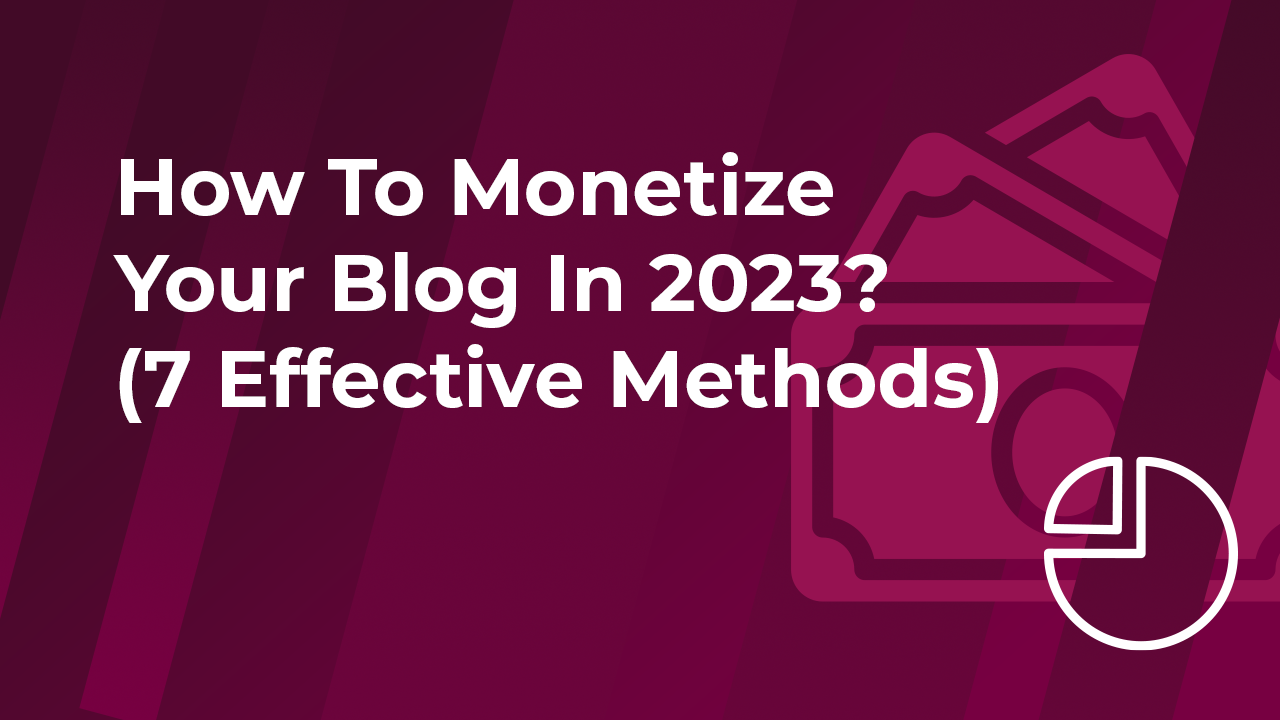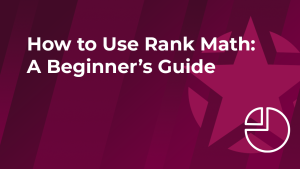Are you a blogger struggling to make money from your blog in 2023? Or, you don’t know how to monetize your blog yet.
No worries, you’re not alone!
Monetizing your blog can be an uphill battle, especially when finding effective methods that work for you and your audience. You may have tried several monetization techniques over the years, only to find out they don’t bring in enough revenue or aren’t the right fit for your content. If this sounds like you, keep reading – you’ll discover seven effective ways bloggers monetize their blogs today!
By understanding these strategies and implementing them correctly, you can finally start seeing results from your hard work.
When Should I Start Monetizing My Blog?
You should consider monetizing your blog as soon as possible. That doesn’t mean you’ll start making money immediately just because you slap a few banner ads. What it does mean is that you see your blog as a business rather than a hobby. This idea is key to making serious money from your blog in the long run. When you start thinking of your blog as a business, you’ll be more consistent in creating content and looking for ways to monetize it.
For example, you will look for things to sell and write about them. This way, you’re creating an income while doing something you enjoy.
Which Monetization Strategy Should You Choose?
Often many bloggers have a hard time deciding which monetization strategies to implement for their blogs. So let’s take a look at three key factors to consider when choosing a method:
1. Different Earning Potential
Not all monetization methods have the same earning potential. For example, if you want to make a full-time living from your blog, Google Adsense is not the best choice because they pay peanuts compared to other strategies. So, the only way to make a decent income with Google Adsense is to have a lot of traffic. On the other hand, with affiliate marketing or selling your products or services, you can make much more money from your blog with a lot less traffic.
2. Some Methods Are Better At the Beginning
When starting, some methods are better than others. For instance, if you have a new blog, then affiliate marketing is one of the best monetization methods. You can review products related to your blog niche, and the commission you get is often higher than other strategies. As your blog becomes more popular, you can start making money using different strategies. But you need to have a lot of readers first.
For example, selling online courses, coaching programs, or creating digital products such as ebooks is best suited for blogs with a large loyal following. A blog is something that evolves, and as it grows in popularity, so does its earning potential.
3. Some Niches Define Your Monetization Strategy
Not all niches have the same monetization options. For example, if you blog about travel, affiliate marketing may be your most reliable source of income. However, suppose you have a news and entertainment website. In that case, you may have more success with Google Adsense or creating a membership program where people pay monthly to access specific content.
So, the best way to determine what monetization methods are right for your blog is to assess your niche and the related earning options available.
3 Reasons: Why People Don’t Make Money Blogging?
To avoid falling into the same trap, here are three common reasons why people don’t make money blogging:
Reason 1) Hobbying
Many bloggers start with the wrong mindset and treat blogging as a hobby. In other words, they write content for fun and often don’t bother with keyword research and SEO optimization. It’s all good as long as you don’t expect to make money from it.
However, if you want to earn money blogging, you need to treat it like a business and start optimizing content for search engines so that readers can find your blog and content.
Also, you should build processes to create content more quickly and effectively and probably hire writers to help you with that.
Reason 2) Short-Term Vision
A blog isn’t something you can launch and start making money overnight. Often new bloggers publish their first posts and expect to start making money in a week or two. Then, they look at their Google Analytics dashboard and see that nobody is reading their posts, and they get discouraged.
In reality, it can take months and even years before you can start making an income with your blog. The fact is successful bloggers need to work for free for several months until they begin seeing a return on their efforts.
That’s why it’s crucial to have a long-term vision and plan, so you can stick with it no matter how long it takes to have success.
Reason 3) Consistently Produce Valuable Content
A common mistake bloggers make is not investing enough in quality content. It’s easy to underestimate the time and effort it takes to create high-quality content that will engage readers and help you build an audience.
Quality content includes keyword research, SEO optimization, well-written copy, and compelling visuals. Investing in quality content will give your blog the best chance of success, so don’t skimp on it.
Not only do you need quality, but you need to produce it consistently. It’s hard to build an audience if you post only once a month or when your schedule allows. Therefore, set up a consistent publishing schedule and stick with it.
Once again, that’s the difference between blogging as a hobby and as a business owner. As a business owner, you don’t start and stop whenever you want. You need to be consistent and disciplined.
Either if it’s raining, sunny, or you don’t feel like it, you need to keep publishing. That’s how you build an audience and make money with your blog.
7 Effective Methods To Monetize A Blog
Now let’s take a look at seven profitable monetization strategies:
1) Google Adsense
Google Adsense is a way for website owners to make money by displaying ads on their websites. If someone clicks on one of the ads, the website owner gets a small amount of money from Google.
Many choose Google Adsense for their blogs because it’s simple to set up, and there are no upfront costs. However, you must remember that the money you make from Google Adsense is usually minimal.
Pros:
✅ Simple to set up
✅ No upfront costs
✅ Customizable ads
Cons:
❌ Low-income potential
❌ No autonomy
I’m not a huge fan of Google ads because of the low-income potential and lack of control. If you don’t have any other choice, then it’s better than nothing! But in the long term, you should focus on an alternative monetization strategy.
2) Affiliate Marketing
Affiliate marketing works like this: you sign up as an affiliate for a product or service and get a unique link to promote it. You get a commission when someone purchases the product or service through your link.
Many bloggers use affiliate marketing to monetize their blogs because it’s simple and profitable. Also, you can make a good income with less traffic than other methods, and you don’t need to manage products or services.
Pros:
✅ High-income potential
✅ No upfront costs
✅ Autonomy over which products and services you promote
✅ Don’t need to deal with customers
Cons:
❌ Time-consuming to find reasonable offers and create content
❌ It can be challenging to get accepted into affiliate programs
❌ You need to promote offers to make a consistent income continuously
Overall, affiliate marketing can be a great way to make money with your blog if you’re willing to put in the effort. You should consider choosing reputable affiliate programs that offer high-quality products and services.
3) Sell Online Courses
Selling online courses is an excellent way to monetize your blog. People will pay for courses that offer them valuable knowledge and skills they couldn’t get elsewhere.
You don’t need to create your courses from scratch. You can repurpose content from your blog or create mini-courses that teach a specific topic. Or you can outsource the creation of the courses to professionals.
The main problem is you need first to have a large enough audience who would be interested in your courses. It isn’t a revenue stream you can start right away. I already made this mistake, and it didn’t work well.
Pros:
✅ High-income potential
✅ You don’t need to create content from scratch
✅ It can be automated with technology and email automation tools
Cons:
❌ Expensive or time-consuming to produce high-quality courses
❌ Not suitable for all types of blogs or topics
❌ It needs a large audience and traffic
You should consider this method a year or two down the road with your blog. Once you have established a reputable personal brand and built a large enough audience, you can start selling your online courses.
4) Accepting Sponsored Posts
Sponsored content is when someone pays you to write a blog post about their product or service. It’s also known as native advertising because it looks and feels like a regular blog post, but a third party sponsors it.
This monetization strategy can be if you have a large enough audience. It’s also a great way to diversify your income streams, as you can offer sponsored posts in addition to other revenue sources.
Pros:
✅ It can be a good source of passive income
✅ You get extra content for your blog
✅ Another alternative way to make easy money
Cons:
❌ You need to have a strong and established blog with a large audience
❌ The income potential is limited, and you can only accept so many sponsored posts
❌ You need to be careful not to damage your brand by promoting the wrong products or services
Sponsored posts can be a great way to make extra money with your blog, but you must be careful. Don’t accept sponsored posts that don’t fit your brand or target audience.
Take the time to research and choose each offer to make sure it’s a good fit for you and your blog. This will also help protect your reputation and keep your readers happy.
5) Membership Website
A membership website is a great way to monetize your blog. With this type of revenue stream, you provide exclusive content and services to paying members.
You can offer a variety of membership levels, from free to premium. You can also set up recurring monthly and annual payments for members to access the content.
Pros:
✅ Offers recurring income
✅ You can create exclusive and valuable content for members
✅ It’s an excellent way to build relationships with your readers and later provide other products or services
Cons:
❌ It can take a while to set up the backend and create content
❌ It requires a significant investment in content and technology to set up and maintain
❌ You need to have a very engaged audience who would be willing to pay for exclusive content
Having a paid subscription website shouldn’t be your first option to monetize your blog. You should focus first on building an audience and growing your blog before thinking about this way to generate revenue.
6) Freelance Blogger
This is a way I recently found out about and thought it was worth mentioning. Many companies are looking for freelance bloggers to create content for them, either full-time or part-time.
But the problem is how do you get hired by these companies?
If you have a blog with little traffic, you can write ten really good posts. Then contact companies that are related to what you wrote about. Ask if they need someone to write articles for them. You can use your blog as your resume and get hired that way.
Pros:
✅ Easy way to start making money with your new blog
✅ You can build relationships with other companies and get more freelance gigs
✅ If companies enjoy your work, they may link to your blog
Cons:
❌ You may not get paid much for each article you write
❌ You need to be able to write quickly and efficiently
❌ It can take time before you build a portfolio of good articles
This is a great way to make money with your blog if you have some writing experience and are starting. Actually, it may be one of the fastest and easiest ways to monetize your blog.
However, it isn’t easily scalable because you can only write a limited number of posts daily, and companies only pay so much for each post.
7) Email Marketing
Contrary to what people say, email marketing is still alive and kicking. You have thousands of companies that make money through email marketing, and you can join them too.
The fact is people who join your email list are more likely to be interested in what you have to offer. You can use email marketing to promote your blog content, products, or services and make money from it.
Usually, to build an email list, you need a lead magnet such as a free ebook, video series, or report to get people to opt in. And an autoresponder to manage the emails and send them out.
Pros:
✅ It’s a great way to stay in contact with your readers
✅ You can send targeted emails and offers. After all, people join your list because they’re interested in what you have to offer
✅ It’s an inexpensive way to drive traffic and sales
✅ You can make money directly from the emails you send
Cons:
❌ It takes time to build a list and create content. And you may not see results right away
❌ You need to be able to write persuasive emails
❌ You need to keep your list updated and maintain it regularly. Otherwise, you risk having a high unsubscribe rate
Email marketing can be an effective way to monetize your blog. But usually, only include it in your blog after you have built a solid audience and gained some traction.
The main advantage is most people who subscribe to your list have a high potential to become customers in the future. And it’s a great way to build relationships with your readers and offer them unique deals you couldn’t get anywhere else.
Conclusion
You should see your blog as a long-term investment. It takes time to see the results you want, but good things will come if you keep working hard on your blog. There are many ways to monetize your website, and you should experiment with different strategies until you find the one that works for you.
Also, some strategies depend on your traffic and audience. Others may require you to take a risk and invest some money.
We look at several options, such as affiliate marketing, Google Adsense, email marketing, or becoming a freelance blogger. Each method has its pros and cons, which you should consider before making any decisions.
So, choose wisely, and implement it on your website. If you want more tips on how to run a successful blog from an expert like Lidiya Kesarovska, check out her video here.
It’s sure to help get you started on the right foot!






Thank you for sharing with us.
the majority of off-page SEO always seeks out backlinks.
Social bookmarking site lists, in my opinion, are a useful resource for us.
Of course, at that point, reading this blog is highly advised.
I found it to be very helpful and informative.
Thanks, most social media bookmarking sites only provide no follow links. These links don’t pass link juice from their site to yours. However, there might be some valid social media networks out there.
Thank you for sharing these methods. It is very helpful.
Thanks, I’m glad you enjoyed the post.
I’m just starting with few blogs that I found interesting to write about and I find this aricle very helpful. Thanks for sharing!
Thank you for this informative post. If I may suggest, considering the implementation of revenue cycle management services could significantly boost financial efficiency and streamline operations.